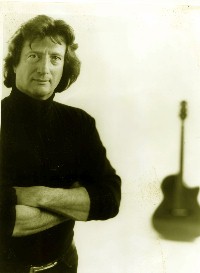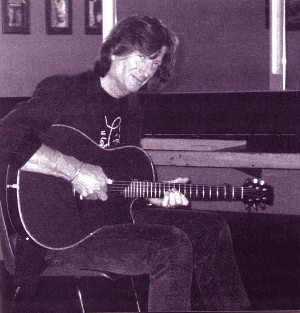Chris Smither: Evolution of a
Livelier Than "Live" Songmaster
by Gary Alexander
Preview of Chris Smither's appearance
at the
Rosendale Cafe,
8pm, Sunday, March 25.
|
 |
There's
a short list of true masters of acoustic format music who are
not quite household names and one of them firmly entrenched on that list
makes an appearance Sunday night at the
Rosendale Cafe.
It's not a "secret" wisdom that there is currently no more
masterful alchemist than Chris Smither when it comes to extracting the
purest blend from the musical argots of blues and folk. But it's not
precisely mainstream knowledge either and this simple fact tends to
enhance Smither's mystique among devotees who recognize his nearly
unique position straddling both traditions at the acoustic threshold of
rock.
This was not the way he planned it in his native New Orleans when
Smither set his course northwards in the mid-1960's to New York and
Boston.
"I was 21 and it was sort of the tail end of the folk and
acoustic boom that gave rise to Dylan," Smither recalls before tipping
his hat to another blues-rooted singer-songwriter. "I had met Eric Von
Schmidt in Florida and he gave me a lot of encouragement. He told me
'You should get up to Cambridge, where people will listen to what you're
doing' and it was true. New Orleans is a famous music town but nobody
was into that kind of music at that time. I was basically doing a whole
lot of acoustic blues, listening to Skip James, Mississippi John Hurt,
Lightnin' Hopkins, Robert Johnson, stuff like that and in the mid-60's
nobody was paying any attention at all to that down there."
 Calculating that he had to set his sails for either California
or the Northeast to arrive at where "it was happening" on his frontiers
of music, Smither landed in Boston and built a reputation which landed
him a contract with a small record company which not only boasted low
profile legends like Townes Van Zandt but also carried Lightnin' Hopkins
in its catalog. His first album for the Poppy label in 1970, I'M A
STRANGER, TOO, was a critical success which contained a Smither-penned
song "Love You Like a Man" that Bonnie Raitt regendered into a hit.
Michael Cusina, who co-produced it and also worked with Raitt, Garland
Jefferys, Eric Kaz and Eric Von Schmidt around that time, soon brought
Smither to Bearsville to record his second album, DON'T IT DRAG ON. This
not only yielded another hit for Raitt in her cover of "I Feel the Same"
and further critical acclaim for Smither but contained one of the first
public glimpses of Bob Dylan's then-mysterious "Basement Tape" songs in
Smither's own cover of the reclusive icon's "Down In the Flood."
Calculating that he had to set his sails for either California
or the Northeast to arrive at where "it was happening" on his frontiers
of music, Smither landed in Boston and built a reputation which landed
him a contract with a small record company which not only boasted low
profile legends like Townes Van Zandt but also carried Lightnin' Hopkins
in its catalog. His first album for the Poppy label in 1970, I'M A
STRANGER, TOO, was a critical success which contained a Smither-penned
song "Love You Like a Man" that Bonnie Raitt regendered into a hit.
Michael Cusina, who co-produced it and also worked with Raitt, Garland
Jefferys, Eric Kaz and Eric Von Schmidt around that time, soon brought
Smither to Bearsville to record his second album, DON'T IT DRAG ON. This
not only yielded another hit for Raitt in her cover of "I Feel the Same"
and further critical acclaim for Smither but contained one of the first
public glimpses of Bob Dylan's then-mysterious "Basement Tape" songs in
Smither's own cover of the reclusive icon's "Down In the Flood."
In all, 8 of the 22 songs on Smither's first two albums were
covers of other writers' works, a fretless pattern which has persisted
in his subsequent releases, averaging 3 or 4 an album.
"I like doing covers," Smither reflects. "Singer-songwriters
don't normally do covers these days and I think most of that is really
kind of an apprehension on their part...If you do nothing but your own
songs nobody can really criticize you by comparison. Whereas, if you do
other people's songs, you open yourself up to all sorts of comparisons
which may not be flattering."
In an indirect way, this is most likely one of the reasons
Smither's own tunes, which have become more polished and precise in
latter stages of his career, aren't more widely covered by other
artists. Although staunch souls like Peter Mulvey, John Mayall, Rosalie
Sorrels and others have cut Smither tunes, the very premise of covering
another writer's song, beyond tribute, is the presumption of bringing
something new to it or at very least performing it as well as its
originator. And there's the rub. Smither's soulful performances of his
own songs are so enthralling that would-be song-suitors have to be
daunted by the challenge of what their own talents could bring to them.
How would you reupholster a classically rendered antique settee? His
extraordinary proficiency as an entertainer creates a peculiar
circumstance which helps to explain the lethargy of widespread
recognition of Smither as a songwriter.
 In concert, Smither plunges in to envelop a song with an
energy and grasp which can virtually outperform a four-piece band; a
disarming business of melodious sound emanating from a single source;
embellishing, massaging, injecting and making it all his own. Although
you can hear it on his recent live solo cd LIVE AS I'LL EVER BE, it's
difficult to fully fathom the intensity of his immersion in the music
without seeing him drive his base stake into its center with his
stomping foot as he twines subrhythms around it on his famous blue
guitar. Thumb and lower fingers vitalize the beat as he picks out its
counterpoint heart with the others and hauls its message and melody into
place with a back-throated, cushioned growl sporting range-limited but
shining syllables like the flash of silver fish in a dark water stream.
Split tempo movements of shoulders, elbows and hips adhering to the
mixed musical currents blend dazzlingly into a collective vehicle for
the song which is so involving that the melodic and lyrical essence of a
tune are mere ingredients of the whole. His consummate showmanship is a
prime factor in marginally reducing the stature of the pure song and
hence the songwriter.
In concert, Smither plunges in to envelop a song with an
energy and grasp which can virtually outperform a four-piece band; a
disarming business of melodious sound emanating from a single source;
embellishing, massaging, injecting and making it all his own. Although
you can hear it on his recent live solo cd LIVE AS I'LL EVER BE, it's
difficult to fully fathom the intensity of his immersion in the music
without seeing him drive his base stake into its center with his
stomping foot as he twines subrhythms around it on his famous blue
guitar. Thumb and lower fingers vitalize the beat as he picks out its
counterpoint heart with the others and hauls its message and melody into
place with a back-throated, cushioned growl sporting range-limited but
shining syllables like the flash of silver fish in a dark water stream.
Split tempo movements of shoulders, elbows and hips adhering to the
mixed musical currents blend dazzlingly into a collective vehicle for
the song which is so involving that the melodic and lyrical essence of a
tune are mere ingredients of the whole. His consummate showmanship is a
prime factor in marginally reducing the stature of the pure song and
hence the songwriter.
But look again. Smither's creations at their root are
subtle and complex while their pace is never forced. They are sometimes
Randy Newman-sly and humorous but where Newman insets the breathing
space for his lines to sink in, Smither is enrapturing his audience with
subrhythms, involving their bodies with a compulsive hunger for
movement; a sway, an irresistible tapping of finger and foot.

Photo by Marc Norberg
|
While Smither's distinctive guitar stylings were first
planted in delta-land feelings, they have evolved into a sound that's
his alone, elastic enough to lean into Tex-mex territory, as he does on
"Tell Me Why You Love Me." Here, he reflects upon the prevailing spirit
in a San Antonio dance hall to observe "All they seem to care about is
how they feel tonight/I've lived that way before/But I can't do it
anymore/Just because it isn't wrong don't make it right."
The self-reflection in these lines may very well harken back to
hazier days of Smither's own life as the Poppy label fell upon hard
times and his contract was picked up by United Artists. He recorded a
third album with Cuscuna called HONEYSUCKLE DOG in Bearsville and New
York City which remains unreleased to this day.
"United Artists was taken over by TransAtlantic Corporation and
basically ceased to exist as a record company," Smither recalls.
"Personally, my life was headed down the tubes at that point anyway. I
was drinking a whole bunch and basically spent about the next 10 years
'out of it'," He adds with a pained and self-conscious laugh. "I still
performed but I didn't really have much in the way of representation and
I wasn't recording."
Smither will not allow the notion that having his new album
locked in a can was a principal contributor to his slide.
"No," he insists, speaking of a decade during which he kept
ends together as a mason and carpenter who played out occasionally. "I
mean it was a convenient excuse but I was a pretty confused, sick
individual. In the beginning I felt like 'Well, one of these days I'll
just get myself together and everything will be okay.' Then gradually,
as time went on, I started feeling like 'Well, the pace has changed and
no matter how good I am, nobody's going to listen to me anymore
anyhow...' But that wasn't a very realistic appraisal. I mean here
you're looking at a really muddled self-justification of a drunk who's
looking for any answer as to why he's not a success other than looking
at himself...
"About 1985 I got sick and tired of the kind of life I was leading
and started to clean up my act. I just suddenly woke up and realized I
wasn't doing what I was supposed to be doing to make myself happy. As I
started to get healthier, I was in a period which happened to coincide
with a reawakening of interest in acoustic music and songwriters in
general. So, I found some representation and started working on tunes
again and discovered that I still had something of a reputation left. At
least I was a known factor. .."
Taking himself as a "known factor" with all of the ramifications
of that perception from his earlier career, Smither applied fresh
degrees of realization and maturity in forging new authority into his
presentation. Without real determination and genuine talent, this might
have been a shaky proposition for any artist but Smither made it a
turning point he had resolved to pirouette in his favor and the rest of
the story is a happy one in the annals of contemporary music.
Smither retrieved a few of the songs on the "lost" album for
his 1984 release on Adelphi, IT AIN'T EASY; a performance oriented album
with only three original songs. His writing chops were back in shape
when he returned to Boston to record 1991's ANOTHER WAY TO FIND YOU and
1993's HAPPIER BLUE on Flying Fish, the latter of which won the
NAIRDIndie Award for best folk recording of the year.
"Flying Fish was an independent label when I signed with it,"
Smither recalls. "I didn't actually sign with them. Essentially, I paid
for (the sessions) and they leased (the albums) from me. Before the
leases ran out, Bruce Kaplan- who was the head man at Flying Fish- died
very suddenly after a very brief illness and the company was taken over
by Rounder in the subsequent shake out and is now one of the Rounder
family of labels."
 Smither's ownership of the albums enabled him to decline
renewal of the leases at Rounder when he found himself uncomfortable at
the label and re-lease them to the Hightone label, with whom he's
recorded ever since. Each succeeding release from Hightone has brought
widening acclaim to the artist- UP ON THE LOWDOWN in 1995; SMALL
REVELATIONS in 1997 and 1999's DRIVE YOU HOME AGAIN, each produced by
Stephen Burton and recorded at the Hit Shack studio of Austin, Texas.
Last year's solo wonder, LIVE AS I'LL EVER BE, was captured in concert
at various venues in Ireland and around the United States. His song
"Slow Surprise" was covered by Emmy Lou Harris for the soundtrack of
Robert Redford's HORSE WHISPERER movie, a film Smither understandably
finds less interesting than its soundtrack album. The presence of one of
his tunes is another notch of recognition of his songwriting abilities.
Smither's ownership of the albums enabled him to decline
renewal of the leases at Rounder when he found himself uncomfortable at
the label and re-lease them to the Hightone label, with whom he's
recorded ever since. Each succeeding release from Hightone has brought
widening acclaim to the artist- UP ON THE LOWDOWN in 1995; SMALL
REVELATIONS in 1997 and 1999's DRIVE YOU HOME AGAIN, each produced by
Stephen Burton and recorded at the Hit Shack studio of Austin, Texas.
Last year's solo wonder, LIVE AS I'LL EVER BE, was captured in concert
at various venues in Ireland and around the United States. His song
"Slow Surprise" was covered by Emmy Lou Harris for the soundtrack of
Robert Redford's HORSE WHISPERER movie, a film Smither understandably
finds less interesting than its soundtrack album. The presence of one of
his tunes is another notch of recognition of his songwriting abilities.
"There's a certain amount of confusion, in my case, between
people who think of me as a songwriter primarily and those who think of
me as a 'blues guy' because I did so much blues in the beginning and my
earlier songs were very blues oriented," Smither notes. "Not to say that
there isn't a touch of that currently but, for some reason, it just took
a long time for people to think of me as a songwriter. Primarily, it
wasn't the first thing that would spring into their minds."
During Smither's "missing years" a British 12-string
wizard named Michael Chapman recorded a memorable series of albums, most
of which were never released in the United States, that were somewhat
reminiscent of Smither's style but without quite Smither's rhythmic
roots injection. Notably absent from Chapman's repertoire were cover
songs and Smither feels that such avoidance may be partly traced to a
perceived negative tone to the word "derivative."
 "I think most, especially young songwriters, are wary of
giving any kind of hint of what their origins are; who they listen to,"
he observes. "I remember thinking that myself as a young
songwriter...It's really amazing that people want you to think that they
sort of sprang out of a tree as a full blown bird, that there are no
origins there. It's just a theory but I can't think of why people are so
reluctant to do covers."
"I think most, especially young songwriters, are wary of
giving any kind of hint of what their origins are; who they listen to,"
he observes. "I remember thinking that myself as a young
songwriter...It's really amazing that people want you to think that they
sort of sprang out of a tree as a full blown bird, that there are no
origins there. It's just a theory but I can't think of why people are so
reluctant to do covers."
Looking back on his first two albums, which were rather
starkly blues derivative and focused on the raw simplicity of the
language of blues, Smither can trace his stages of development.
"I didn't think it at the time but those were young man's
records," he laughs. "I'm an older man now. I've learned a lot and
actually become a much more disciplined writer than I was. The songs are
just more tightly focused. I come up with things to say and I say them
without wasting a whole lot of time in generalities. I think I've got a
better idea of what I'm doing, plus I'm not plagued with this sort of
amorphous, nebulous notion of becoming a 'star'- which I wanted to be
when I was a kid. That was before I realized that you don't have to be a
star to make a quite respectable living in the music business.
"As a consequence everything has just improved and
there's an obvious change. In a way, it's sort of a tautology. You have
to keep changing in order to keep doing it. You can't keep repeating
yourself," Smither reflects, noting that, although he had covered a Mick
Jagger tune early on, he finds the Rolling Stones more recent releases,
"as good a band as they are," cluttered with "rehashes of every Rolling
Stones riff or idea that I've ever heard. If you don't change, then you
basically die as an artist."
Conversely, since his comeback, Smither has continued
to grow progressively in creative directions and in fan appreciation.
Over the past decade, Smither has found enthusiastic audiences all over
North America, the British Isles and Australia. Making ever wider
circles of appearances has elongated the regularity of his visits to the
HudsonValley area. That's reason enough to circle March 25th on your
calendar.
-Gary Alexander
Gary Alexander
is an independent journalist and scholar whose focus of
interests range through a variety of disciplines. Under various names,
he has written (and ghost written) upon history and current event;
science and technology, as well as music and the arts in books and for
national periodicals. While particularly attentive to the subtle and
complex impact upon cultural imagination and contemporary structures of
presumption which activity in the above mentioned topics tend to have,
Alexander treats his topics with a slightly more than occasional resort
to humor.
Posted on March 7, 2001
| 
